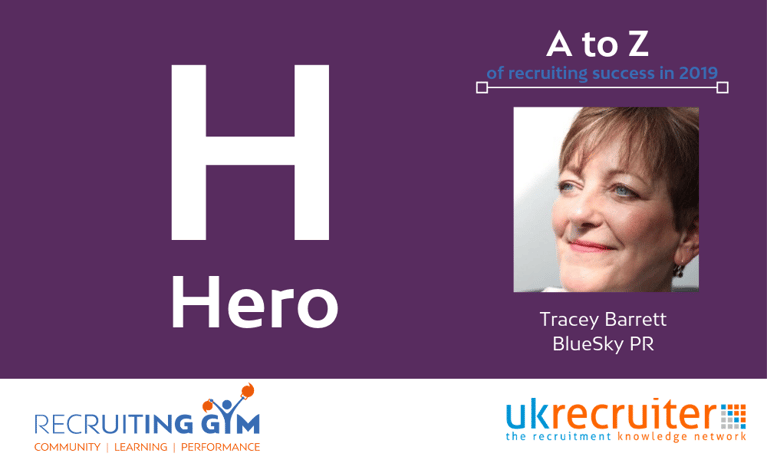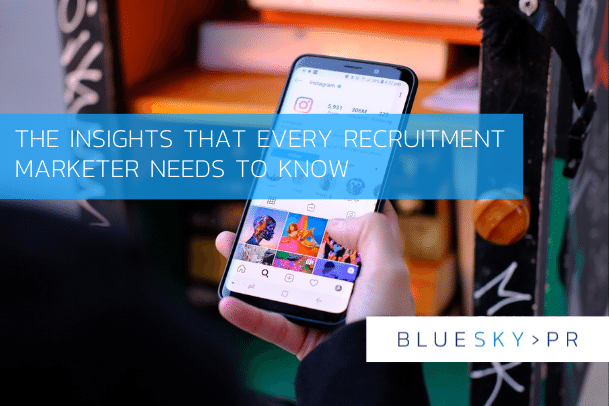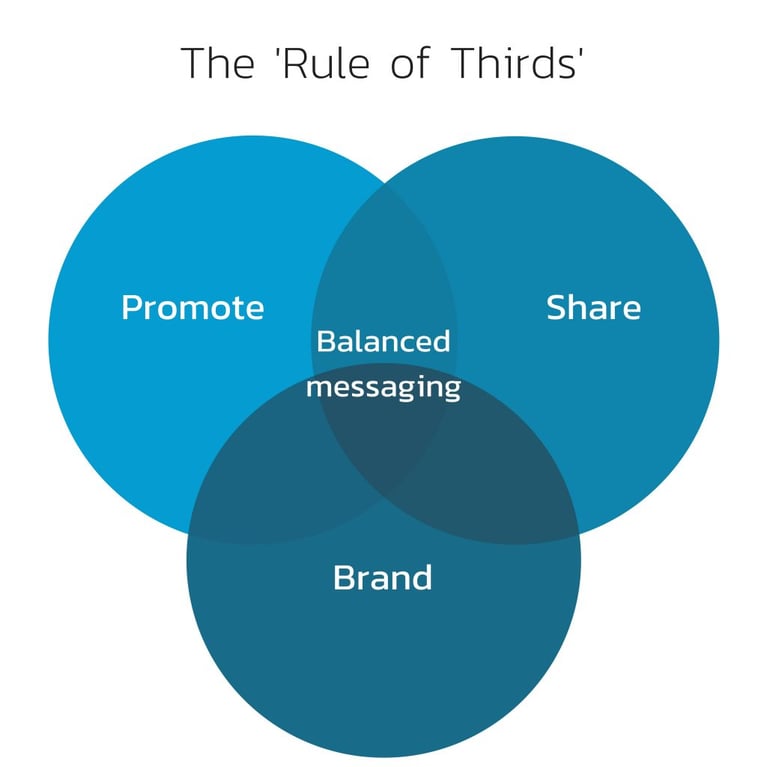
Building your brand through content contribution - guest blog
A few years ago, I came across an idea called 'pay it forward'. If you are unfamiliar with it, it's actually rather a nice idea that simply promotes the notion that if everyone does something to help someone else, then, in the long run, we all benefit. The same concept of collaboration to make things better for everyone underpins the value of content contribution, in that your brand will feel the benefit of helping another business build theirs.

PR Lesson: developing the best story
Over the coming weeks the BlueSky PR recruitment and talent management team will be sharing some of their PR lessons. While I certainly have many to talk about (it’s an age thing – I’ve learnt a lot in my long career!) there’s one lesson that crops up as a recurring theme in conversations: how can you develop the best story.

How to get more engagement on your social media
With 45% of the total world population using social networks, businesses now have a fantastic and cost-effective way of reaching potential customers and interacting with existing ones worldwide. However, to reap all the benefits that come with using social platforms, you must always be thinking about how to get more engagement on your social media. Even if you have many followers, you want to aim for lots of interaction as this will help you appear higher in people’s feeds. A channel without much engagement can be perceived as dull and doesn’t generate all the business benefits of a thriving, active page. That’s why it’s crucial to understand how each platform you’re using works and how it’s best to target users. Here’s how to get more people liking, sharing and commenting.

Why you should always check your sources
Whether you’re crafting blog posts, white papers, articles or press releases, including insight from third parties can boost the authority and reach of your communications. I’ve previously written on how statistics or quotes pulled from public domain can elevate your thought leadership offerings from a rambling rant, to objective and measured insight, in the eyes of your readers. However, it is crucial that you always check your sources.

How does the Twitter algorithm work? Answers for recruitment marketers
With over 500 million tweets sent every day, it is essential to have an understanding of how Twitter’s algorithm works if your recruitment firm is to rise above the noise and attract new candidates and clients on the platform.

How to handle a pr crisis
If there’s one PR issue that recruitment agency owners are arguably most concerned about it’s what to do in a crisis. Whether this be a breaking news story about some less than scrupulous actions from an employee or potentially detrimental information about your firm’s finances being leaked, implementing a damage limitation process at this time is crucial for businesses of all sizes. But it’s not an easy task. So how should you handle a PR crisis?

How to and why to encourage employees to share your business’ content
In the business world, and particularly in recruitment, people are considered a company’s greatest asset – and rightly so. Not only do your staff get the actual work done, they also hold the key to your very best marketing strategy – employee advocacy.

How to create a PR plan
When it comes to PR, sitting down and strategising before embarking on a campaign is essential. A well thought out, comprehensive strategy can often make the difference between success and failure. Correct planning will help you organise your ideas, make sure your core messages are congruent, work out your target audience and decide on the tactics that you will use to target them. While ‘make a plan’ might sound like the most obvious statement in the book, it’s something that often gets overlooked or doesn’t get as much attention as it deserves. So, with that in mind – here’s some simple tips for how to create a PR plan.
The PR toolkit to communicating and presenting
We often hear about the importance of having good presentation skills in life. But while for some, the idea of presentations seems exciting and a great way to communicate their thoughts – for others the idea of public speaking and presenting can understandably fill them with dread. It can be an utterly nerve wracking experience standing up in front of a crowd – no matter what the subject matter is. However, presenting skills are crucial in the art of communication, and particularly important when pitching for new business, training a team or if you are involved in public speaking.

Should recruiters be hiring a PR agency?
It might sound a little biased coming from me, but I’m going to explain why hiring a PR agency is worth it.

How to measure PR effectively
Companies invest considerable time and money into PR campaigns. While PR measurement may be a chore to some, without it you won’t learn anything, and won’t be able to improve future PR efforts. Measurement is an integral part of communications, and something that pays dividends in the long run. However, so many companies are neglecting it, with 50-60% of PR campaigns having no method of evaluation at all. Here’s how to measure PR effectively:

Maximising your brand through a winning PR strategy
Branding and PR are key ingredients to the success of any business. Therefore, from the word go it’s important a company has established its brand identity, message and image it wants to put out there. Similarly, in order to maximise your brand, a PR strategy is a vital tool for helping organisations grow an industry presence, communicate their message and further their reach. In essence, to get the most out of your business you need the two to work in tandem as they influence each other. With this in mind, here are three key ways a PR strategy can help build and maximise your brand. Consistency is key for brand identity Look at Coca Cola for example – it’s one brand that we all value and recognise across the globe. With stats showing 98% of the world’s population recognise the brand name, while it certainly is impressive – this didn’t happen overnight. Sometimes unknown to the naked eye, it takes a PR and marketing strategy that is consistently and succinctly driving home a company’s message, its brand image, latest news and communicating this with a targeted audience. In this instance, Coca Cola is all about enjoying a light carbonated drink – so the PR strategy is all about making sure audiences and consumers associate good and positive feelings with the brand. A case in point, the company’s latest motto is “Taste the feeling” which is linked to all the new flavours the business has recently launched.

PR skills training: why it matters
We’ve previously written on why public relations is an art, rather than a science. However, that doesn’t mean that PR skills training isn’t vital to the professional success of individual practitioners – and the media campaigns they develop and execute. The benefits of professional development As a consultancy which specialises in the recruitment and talent management sectors, we often work with our clients to share stories around the benefits of professional development. Research from Guidant Group, for example, found that almost half of businesses (47%) believe that developing staff internally will be their greatest opportunity over the next three years. The Association of Professional Staffing Companies (APSCo), meanwhile, often shares insight into the impact that CPD has on boosting staff engagement, motivation and productivity.

Hero content – a recruitment marketing dream
I recently contributed to a great initiative launched by Alex Moyle and Louise Triance called the A-Z of Recruiting success. You can see all the contributors on Alex’s blog but my particular letter was H for Hero Content. For me Hero Content really is a recruitment marketing dream because it gives you so much more to work with than one piece of content. Content driven recruitment marketing We all know that original content that adds value and addresses a particular pain point of your audience is likely to get more engagement than any other. But for busy recruitment marketers or for owner managers that don’t have the luxury of an in-house recruitment marketing team, this can be difficult to achieve on a regular basis. This is where hero content really comes into its own.

8 overlooked ingredients of a successful blog post
In my short time at BlueSky, I’ve written a lot of blogs. This has meant a fair amount research on what makes a great post, and also reading some which aren’t very good at all! If my experience has taught me anything, by making sure you do these often overlooked things, you can take your blog to the next level. So, here's my list of 8 overlooked ingredients for a successful blog post...
Inspiring PR Strategies: Key takeaways from the Cision CommsCon event
Joining hundreds of PR professionals for a day of insight, debate and discussion, I recently attended the #CommsCon 2018 event hosted by Cision. Designed to inspire PR and comms strategies for the year ahead, attendees heard first hand from major brands and journalists, topics included: how roles in the industry have changed; what stories they want to hear from PRs; how to ensure your creating content with a purpose; and the best approach to crisis management. Below are the key takeaways from the event to help inspire your 2019 PR strategy. Purpose driven content … why does it matter? While most organisations recognise the value of creating content based on news, shared interests or worthy causes – to have content with a real purpose extends beyond that. As Peter Heneghan, Head of communication at LADbible said during the discussion, “We often get asked, what are the core ingredients to make something go viral – actually, the intention shouldn’t be to go viral but to make content an audience will love and relate to.”

Is our PR the same as your PR? Maybe not…
“So, what is PR?” Sometimes I really dread this question when I go to networking events – it’s one of those things you know you’re going to be asked, but in many cases, my response is never quite believed. Whenever I explain what I do I’m challenged: “Well, that’s copywriting, isn’t it?”

No one cares if you’ve decorated your office: PR stories of interest
The disparity between what a business thinks is an interesting PR story, and the information that actually grabs the attention of target publications, is often vast. However, by viewing potential press angles through the eyes of the audience, brands can uncover stories which won’t fail to make headlines. In reality, even the most niche publications are unlikely to have much interest in the fact that you have had an office refurbishment, refreshed your website or invested in a new coffee machine. That is, of course, unless you have a solid angle as to ‘why’ you have made those changes which you can lead on: for example, you have updated your jobs pages to be accessible to disabled candidates to increase applications from this underrepresented group. Otherwise, save those nuggets for building your employer brand though social media. Sitting on a wealth of information

Three social media hacks to increase the visibility of your posts
Social media continues to transform the way in which recruitment agencies are able to reach their target audiences, source candidates and showcase their company culture.
Disability in Recruitment – what’s the next step?
We recently attended a roundtable hosted by The Recruitment Industry Disability Initiative (RIDI), which aims solely to break down the barriers facing disabled people in the workforce. On the day, attendees came together to discuss the hurdles disabled individuals face and how the recruitment industry must work together to truly make a difference. The main theme centred on how we can enable technology for disabled talent and the impact it is currently having. Attendees discussed the types of technologies available which are designed to help those with impairments and disabilities. Challenges voiced ranged from ways to alter the application process, how to change attitudes and the importance of reasonable adjustments. Currently 75% of disabled people believe their condition is a barrier to employment, while the Business Disability Forum has found that 71% of disabled people will click away from websites they struggle to use or access content on. With this in mind, it is crucial that recruitment firms take a fresh look at how accessible application processes are to disabled candidates if they are to tap into this valuable pool of talent.

BBC’s The Bodyguard: the power of reactive PR
While expertly executed PR programmes, based on carefully constructed plans, are the bedrock of any successful PR campaign, reactive PR and marketing activity can offer brands a fast-track route to getting their voices heard. And this technique was something that Counter Terrorism Policing UK demonstrated perfectly, when it capitalised on the popularity of BBC’s The Bodyguard: the most watched new British drama in more than a decade, with more than 10 million viewers tuning in to the first episode. Demonstrable ROI By creating a social campaign tagged to the hit show - which offered behind the scenes insight and directed viewers to learn more about working in the sector - the comms team successfully tapped into a ready-made audience to gain demonstrable ROI.
Sitting on a wealth of information? Here’s how to make the most of it
There’s no doubt that recruitment agencies are sitting on a wealth of important information, even if not all of them realise the full value of it. While recruiters will certainly be drawing on their own knowledge and the data in their CRM to help them source, shortlist, interview and place candidates, agencies will also benefit from sharing their understanding of the hiring landscape more widely. At BlueSky PR, we know that a great way for a business to position itself as an industry expert is by highlighting its unique insights into candidate and client behaviour. Here are our top tips for making the most of the information that you have.
The Nike scandal – what can PR professionals learn?
You may have heard about the bold move from global sports company Nike, selecting Colin Kaepernick, (ex-NFL player and US civil rights activist) as the new face of its global advertising campaign.

How to win back lost customers through marketing and PR
Given the very nature of recruitment, losing a client to a competitor is a tough, but rather common situation, particularly as prices become increasingly competitive. However, all is not lost. Rather than bemoan the fact that the client has moved on (even if you know they are prioritising money over quality), why not take a more strategic approach? You’ll likely have plenty of other highly engaged clients who value your agency – use them to your advantage to not only win clients back, but engage with new ones as well. Produce case studies of the results you’ve delivered to these businesses, focusing your attention on how only your agency could achieve this. If you’ve recently lost accounts to lower priced competitors, place an emphasis on the return on investment your clients have noted – including the added value that they received from using your agency over others. And, perhaps more importantly, share this content far and wide. Get people liking and talking about the case studies across your networks. Consider the hashtags you’re using as well. Look back at posts from your previous clients’ accounts and use any relevant ones to ensure they see the content you’re sharing.

The power of polls
Positioning your brand as a thought leader in its field through PR takes not only a superior understanding of the market, but also time and dedication. However, while there is no shortcut to building a solid media profile, generating data through surveying your networks can supercharge a press release by boosting both newsworthiness and the potential to repurpose. Flick through any national newspaper, or scroll through any major newsfeed, and you’ll find that a significant number use statistics as a hook. Thanks to the power of polls, we know that Magnums are the UK’s favourite ice cream, England’s progress in the World Cup increased national pride and two thirds of voters are baffled by Theresa May’s Brexit policy. None of these stories are particularly surprising – but you can guarantee they wouldn’t have made headlines without the figures to back them up.

How does the Instagram algorithm work? What recruiters need to know
Have you ever wondered how the Instagram algorithm works and how you can get your recruitment firm’s content in front of more users?
PR: Outsourced or in-house?
If there’s one thing we can guarantee to be asked in PR it’s this: why should I outsource to you rather than manage it myself? While it’s completely understandable that business owners will feel reluctant to put their reputation in the hands of others, my argument is that they should. Yes, I’m sure many of you are thinking “well she would say that wouldn’t she” but let me explain why. Let the experts be the experts We each have our own job to do. For firms involved in the talent management arena, the focus of every member of staff will be winning new clients and growing their network. As a result, writing the next company blog or an article for a leading industry-specific publication will be at the bottom of their priority list – even if it is beneficial for business growth. And, of course, there’s the further issue of feeling comfortable approaching a journalist in the first place and finally putting the metaphorical pen to paper to write a feature for a publication. Given that editors and reporters move constantly, freelancers come and go and news platforms spring up continuously, knowing who to target with what information is a time-consuming practice. One that will certainly be put on the back burner by individuals with an already overloaded to-do list.
Women in Recruitment - what’s the next step?
As partners of The Recruitment Network (TRN) we recently attended the Women in Recruitment roundtable where industry representatives came together to discuss the biggest hurdles facing females in recruitment today. The main themes focused on why increasingly talented women are leaving roles early in their careers before they reach senior positions and the reasons behind this. Challenges voiced around the table ranged from the gender pay gap in recruitment, potential discrimination such as age, and the lack of role models in the industry. In particular, we looked at whether the culture of recruitment means that women either leave the industry altogether or don’t view it as a career of choice. With this in mind, here are some top strategies to get the ball rolling to encourage and empower more females in recruitment today: It starts with surveys Getting back to the root cause is key. For organisations to master retention and engagement, surveys of all female employees are a great way to identify the top factors that make them want to stay with the company and let’s employers know what to delve deeper into. Focusing on bite sized chunks and information gathering is the first step towards progress.

Why your content isn’t working: the cardinal sins
Is your recruitment firm struggling to get candidates and clients interested in your content? If the answer is ‘yes’ you could be committing one (or more) of the cardinal sins of content production. So what are the top reasons your content isn’t hitting the mark? And, crucially, what can you do to fix it? You’re selling This is a big bug bear of mine, and something that far too many companies do. They use their content – whether that be a blog, newsletter or white paper - to sell their services instead of demonstrating their expertise. Potential candidates and clients want to know that you are experts in your field, an agency that can help with their career or talent attraction strategies. Leave the selling to advertorials or a pitch meeting when you have got your foot in the door! You’re not adding value In the same vein, too much content doesn’t address the pain points of the intended audience. When planning content themes, it’s absolutely vital that they are based on the information your audience seeks. Think about conversations you have had with clients and candidates, what’s keeping them awake at night? What recruitment struggles are they currently facing? What advice can you give a candidate about their job hunt? The list is endless. However, the key is that your content encourages them to read on because it will add value to their current situation.

3 reasons why your recruitment agency should outsource social media
“Should we be outsourcing our social media?” That is a topic many recruitment agencies are currently having internal discussions on around the country.
Can a modern brand survive without a presence on social media?
When pub chain JD Wetherspoon recently announced its decision to shut down all of its social media channels – including Twitter, Facebook and Instagram – with immediate effect, it raised eyebrows, not least from those who understand how a presence on those platforms can add value to a business, if they are used strategically. Chairman Tim Martin said, in a now deleted tweet, “We are going against conventional wisdom that these platforms are a vital component of a successful business,” adding that the managers of its 900 pub branches agreed with him. He later told a journalist that, "On a commercial basis, it saves people in the company time and that will enable them to get on with their own jobs." Devise a social media strategy There are a few puzzling things about this decision. Firstly, Wetherspoons had more than 44,000 Twitter followers and more than 100,000 followers on Facebook. Clearly, there was an interest from customers in having social media engagement with the brand. However, interactions on these platforms were very moderate, with many posts receiving only a handful of likes. For a big company with so many followers, such a low level of engagement should have raised a red flag indicating that it hadn’t mastered the art of delivering relevant content to its followers which truly engaged them. The demand was there, but the social media strategy clearly wasn’t. Businesses need to have a clear idea of who they are targeting, what they want to say and how best to convey that message. If The Museum of English Rural Life can achieve nearly 107,000 likes (and counting) with its perfectly judged tweet about a ram, then Wetherspoons really needed to be thinking more creatively and aiming for far higher levels of engagement, adjusting the strategy if it wasn’t appearing to work.
Do shock tactics in PR really work?
We know all too well; the same generic type of careers pages can sometimes fail to engage and attract the best individuals which can result in top-talent going amiss. For many businesses and marketing teams there is the challenge of being tasked to regularly provide informative, creative and attention-grabbing PR campaigns. And while this will often be tailored to certain objectives or showcasing new products which can affect how the campaign is executed – there are still key strategies to bear in mind. Recently we have seen things going awry with big brands under fire for their somewhat suggestive adverts. For example, Heineken being called out for its low-calorie beer advert labelled as “terribly racist” and the question is…could we be seeing a new trend of businesses deliberately choosing to cause uproar and conflict in order to raise their profile in the media and create a stir around their PR campaigns?

How to write a winning award submission
Entering corporate awards can be a great way to gain exposure, enhance brand perception and validate your market position. However, for each category, there can be only one winner – here’s how you can stand out from the crowd and earn your status as an ‘award winning’ organisation. Choose wisely To be in with a chance of taking home a trophy, you’ll have to invest a hefty chunk of time and resources into collating the information needed. For this reason, taking the decision to enter awards shouldn’t be taken lightly – it has to be worth the effort. Do some research to determine which awards have kudos in your industry and are recognised by your customers – whether that be The Sunday Times’ ‘100 Best Companies to Work For’ or the Concrete Society's Awards for Excellence. For example, we’ve recently been shortlisted for the Recruitment International Supplier Awards in the category of Best Marketing & PR – a hyper-niche category from a brand that our clients are familiar with and trust.

The magic of ‘piggybacking’
Jumping on the latest news can be one of the most effective ways to generate content for your recruitment agency. Not only does it show that you are ‘on the ball’ and efficient but also dedicated to the client and their reputation. But in a digital 24/7 world, you have to act fast amongst the rest. Recognising the appetite for pressing subjects and topical events such as International Women’s Day and National Apprenticeship Week are great ways to keep you one step ahead and achieve prime time coverage. So here are some top tips to maintain a rapid smart-proof response to the hot topics and build your brand further with your target audience. 1. Plan your approach While this may seem obvious, monitoring the daily news agenda, spotting opportunities online and staying on top of current events is key to ensuring nothing gets missed. Being aware of important dates and times is also essential to be ready in advance for a related story that might get released last minute. Calendar events such as International Women’s Day are highly celebrated throughout the media and covering the story fast before anyone else is the beauty of preparation, at a time when the press you’re targeting might be looking for comment or writing on the story themselves.
KFC: What can PR professionals learn from the Colonel?
As far as PR challenges go, a chicken shop running out of chicken is a pretty major deal. Which perhaps explains the furore which ensued when KFC was forced to close the majority of its 900 restaurants after bringing a new delivery partner on board. The fiasco was covered extensively across the UK mainstream media, with the most influential outlets from the Sun to the Financial Times offering real-time updates on the situation. Social media, meanwhile, went into overdrive, with fans of the chain demanding, among other things, that the government calls an emergency Cobra meeting over the shortage. Unsurprisingly, rival brands were only too quick to ride the wave of publicity. Burger King offered free food for a year to a customer who told ITV News she was forced to visit the burger joint after finding her favourite chicken shop closed, while Iceland took to giving away frozen chicken strips.
Crisis 101: top tips for dealing with a PR emergency
Most businesses will find themselves dealing with a difficult public relations event at some point and some may experience a full-blown crisis, such as data theft, cyber-crime or internal malpractice coming to light. In our digital age, news goes viral almost instantaneously, meaning that the implementation of a swift and effective crisis management strategy is essential. The wrong approach can irreversibly damage your brand and its relationship with clients and business partners. One example of a PR disaster is Oxfam. PR Week says that, “As far as communications crises go, the latest Oxfam scandal has it all: public and media outcry, criticism from corporate partners, and serious questions from parliament and regulators.” Senior figures at the charity paid local prostitutes while on business in Haiti in 2011, which was reported on by The Times. The organisation has been heavily criticised because although it investigated the events at the time, it didn’t disclose them to a number of stakeholders and regulators. More examples of PR disasters
The Edelman Trust Barometer - the importance of traditional media
This year’s Edelman Trust Barometer - which measures trust across a number of institutions, sectors and geographies – reveals that social media companies have lost the trust of the public. In fact only a quarter of the UK population now say that they trust social media as a source of news and information. However there has been a huge increase in trust in traditional media (61%), reaching levels not seen since 2012, as well as a rebound in trust in experts and leaders. So what does this all mean for recruitment marketers? Media coverage matters Well first and foremost, no one is saying that social media isn’t important – it is obviously a fantastic way to broadcast your message – however what is more crucial than ever given Edelman’s research is that the content and messages you are broadcasting have credibility. And how do you get that credibility? One way is through appearing in the press that your target audiences read, trust, and turn to for information. PR is just a cost Despite this, however, many recruitment marketers that are only too eager to get their company featured in the press are prevented from doing so effectively. And it boils down to the same argument we hear time and time again. PR is deemed a cost rather an investment, a vanity project, and something that doesn’t help the business development strategy and deliver leads. The result is that too many agencies shy away from traditional media relations, instead opting for advertorials or nothing at all. So at a time when Edelman’s research clearly demonstrates that media really does matter, how can marketers get press coverage and, crucially, demonstrate its ROI? Getting press coverage…and effectively leveraging it

How will Facebook’s news feed changes affect your recruitment agency?
In the early hours of Friday 12th January, Mark Zuckerberg announced changes to Facebook’s news feed algorithm that will have huge ramifications for every single company that uses the platform. “Recently we've gotten feedback from our community that public content -- posts from businesses, brands and media -- is crowding out the personal moments that lead us to connect more with each other,” Facebook’s co-founder wrote. To combat this, Facebook will be showing less content from businesses, brands and media whilst prioritising ‘meaningful interactions between people’ – in essence returning the platform to its original goal. So, what do these changes mean for marketers at recruitment firms? What we know about the news feed changes so far:
Getting ROI from your PR: A round up from Recruitment Agency Expo
Last week was the annual Recruitment Agency Expo at London Olympia, where recruitment professionals gathered to hear from industry experts, network with peers and get all the latest info on the UK’s staffing sector. Among the many influential speakers stood BlueSky’s very own Managing Director, Tracey Barrett. So for those that missed out, here’s a roundup of Tracey’s presentation on Getting ROI from your PR. Firstly let’s start with the basics, why does PR and marketing really matter in recruitment and why should you bother? As Tracey discussed at the conference, it’s a crowded market out there. Last year alone saw 9,000 start-up agencies, so differentiation is key. Really ask yourself if your company has a USP or are you promoting the same generic selling points that clients and candidates are all too familiar with? An analogy Tracey used was to aim to be that purple cow in the field, and think about whether the value you are adding sets you apart. The value you add could be through market intelligence or thought leadership, but consider how you are going to communicate this.

Top 5 tips for creating engaging content
Most firms understand the importance of having original content such as blogs, company news and professional insights on their websites. Firstly, if visitors to your site discover something useful or interesting, they are more likely to return. Secondly, it allows your firm to position itself as an authority and provider of relevant, engaging information. Finally, quality content gives you more material to share on social media, consequently creating wider exposure. This is also important as research shows that social shares influence where your website appears in search rankings. So, here are our top five tips for creating material with impact.
PR for start-ups: what’s the point?
Make no mistake, getting any fledgling business off the ground is tough, regardless of the founder’s skills, experience and level of dedication. And despite the huge potential rewards associated with setting up your own company, it’s a sad fact that around half of new start-ups fail in the first five years. The recruitment sector is particularly competitive. According to Companies House data, over 9,000 recruitment consultancies set up shop in the UK during 2017. That’s an average of 818 new agencies being registered every single month. Each of these businesses will need to make important decisions around premises, the software and systems they invest in and the service providers they choose, while ensuring they’re compliant and ready and able to trade as quickly as possible. So it’s unsurprising that marketing and PR often drops off the end of the ‘to do’ list.

The biggest PR fails of 2017
So, we are almost in 2018. Depending on the year you’ve had, you may be sad to leave 2017 behind or, quite frankly, be glad to see the back of it. In the PR world, there are definitely some people wishing that they could go a step further and get in a time machine to restart 2017 from scratch. Here are five of the biggest PR fails of 2017.
Blurred lines: Differentiating recruitment marketing and PR
In a world where the lines between advertising, marketing and PR are becoming increasingly blurred, it’s little wonder that some business leaders struggle to see where one function ends and another begins. Add in the role played by social media and it’s easy to see why there’s so much confusion.
PRs, if you had one pearl of wisdom – what would it be?
Avoiding disaster, navigating networking, and pitching like a pro – what advice would our BlueSky team have for the world of the PR professional? “Don't cut corners on the quality of anything you write,” says Ian Hawkings, Head of our Education Practice. “Every note, email or tweet - both internal and external is a tool that can either help build, or destroy your brand.” It’s something simple that goes a long way, but keeping your writing to the highest standard can get other people to see things the way you’d like them to. Whether that’s proposing a new idea to a client, or getting a journalist to accept your pitch. And Peter Remon, Account Executive here at BlueSky, has some advice when it comes to pitching. “Research exactly which publications are interested in the news you wish to share and, more importantly, which journalists from these publications are writing about it. This does take time, but it is a worthwhile exercise. After all, it is far better to pitch to five relevant journalists than scatter your pitch to 50 journalists who are not.”

Why you should be using the ‘rule of thirds’ in your social media strategy
One of the most common dilemmas facing recruitment marketers when it comes to producing a social media strategy is deciding on the content mix. What should you be posting? How many job posts is too much? Should you be sharing articles from third-parties? In steps the social media ‘Rule of Thirds’ model and how it can benefit your recruitment firm...
How diverse is your recruitment firm? #RecruitmentMeansDiversity
I’m delighted to have been invited to contribute to The Recruitment Network’s new initiative #RecruitmentMeansDiversity which has been designed to shine a spotlight on how the recruitment sector attracts, retains and treats its talent. We are already working closely with The Recruitment Industry Disability Initiative to help to break down the barriers faced by the millions of disabled people who are entering or progressing through the job market and having recently received a highly commended award by ENEI for a diversity and inclusion campaign, it’s an issue close to my heart.

Essential steps when a reporter says 'yes'
You’ve identified the ingredients for a perfect story, fired off a killer email pitch or picked up the phone and articulated your client’s experience, expertise and angle. The editor or journalist wants to cover the story Result! But where do you go from here? What are the essential steps when a reporter says 'yes'? Be clear on what the publication needs from you It may sound obvious, but be sure that your expectations are aligned. You may have thought that you were setting up an interview, while the commissioning editor had a 1,500 word, Harvard referenced, by-lined article in mind. Make sure you’re both on the same page.
3 stories PRs shouldn’t miss this week
Weinstein and the power of the media Unless you’ve been living under a rock for the last few weeks, you will have heard the Harvey Weinstein story. For obvious reasons, the scandal has been well covered by the media, however in the age of instant news, some people are already bored of it. In fact, I overheard someone in my local coffee shop opening a newspaper and sarcastically saying “oh look, more about Harvey Weinstein, it’s like there’s no other news”. I’m sure there are some PRs who are worried that this story will overshadow their current publicity campaign and others that are working tirelessly to shut down the story and defend Weinstein. Some publications are even using sexualised images of the victims to gain attention, which is not helping the perception of women as objects for male sexual use.

3 reasons why your CEO should be using social media
Whilst getting social media buy-in for your brand can be a challenging experience, one thing that is often much more difficult is persuading your CEO to create their own social media accounts. Common objections often include being too busy to post on social media, not being digitally savvy enough or not having anything interesting to say. And this attitude is reflected in research from America which has revealed that 60% of Fortune 500 CEOs have no public social media presence. So how can you get them on-board?

How to be an effective media spokesperson
We’ve all been there. You turn on the TV or open the morning paper only to see a story which is centred around your business sector splashed everywhere. You knew this story was going to hit the headlines months ago – why aren’t you being interviewed along with the other experts? Here are our top tips for becoming an effective media spokesperson: Be visible Becoming a thought leader takes commitment. If a reporter or researcher is looking for insight on GP shortages in rural Essex, for example, the obvious place to begin their search is online. Make a habit of sharing snippets of your expertise and opinions on the news across social media, your own blog and third-party platforms to increase your visibility. We’ve had clients appear on Sky News after TV researchers stumbled across opinionated blog posts. Lay the foundations and the opportunities may just come to you. Be a specialist
